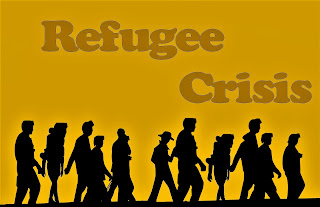When the Arab Spring reached Syria’s borders in 2011 and the Assad governance violently combated protesters demanding social justice and republic, the Syrian Refugee Crisis started to buildup and reached its extreme.
After the civil unrest and chaos, the Syrian conflict escalated and it caused to create the world’s largest exile population.
As of todate, the civil war has redounded in the relegation of roughly13.2 million people, including 6.6 million deportees, 6.2 million internally displaced people, and 140,000 shelter campaigners.
The Syrian exile overflows have sparked a dangerous rise in exclusionary populism, right- sect nationalist movements, and public security enterprises. Anti-immigration and anti-asylum candidate sentiments have continued to rise in affected countries.
This escalation has stemmed from enterprises arising from perceived pitfalls to public security caused by Syrian ‘ outlanders, ’ which has redounded in their ‘ othering ’. It has also arisen from post-9/11 perceived liaison between Islam and terrorism that have framed deportees from the Middle East as possible ‘ terrorists ’ and ‘ security pitfalls ’
The rising salience of these sentiments has allowed colorful far-right political parties, including in Israel and Cyprus, to gain political power and recognition during the once decade. These have espoused harsh immigration programs and othered and barred emigrants from Syria
Massive fire breaks out at. Israel and Cyprus are located at the geographic crossroad of multiple societies, making these two countries destinations for deportees as they travel to seek endless shelter in Europe.
Unfortunately for shelter campaigners, both Israel and Cyprus don't have accommodating shelter programs and are ranked amongst the worst countries in the world for exile integration and acceptance into civil society.
This chapter examines how political actors have sought to securitize Syrian deportees in Israel and Cyprus and how the governments of those countries have responded to those sweats and companion nativistic claims directed at the displaced.
The Israeli Response to the Syrian Refugee Crisis National security is a predominant concern in Israeli politics and policy and that has been so since the state’s establishment in 1948.
After the Holocaust, the Israeli leaders viewed themselves as innocently obliged to give a haven for Jews from around the world, therefore egging the nation’s aspiration to produce an ethnocentric, Jewish maturity state as the only way to save its identity.
The 1950 Law of Return sought to realize that thing, stating that any Jew could apply and automatically be granted citizenship in Israel without length of occupancy or language conditions.
This policy approach has produced a strong sense of ethno- nationalism within the country’s population and has also made immigration a hotly contested issue, as ethnically different exile and shelter- campaigners have been perceived extensively as potentially dismembering the integrity and security of the Jewish maturity state.





0 Comments